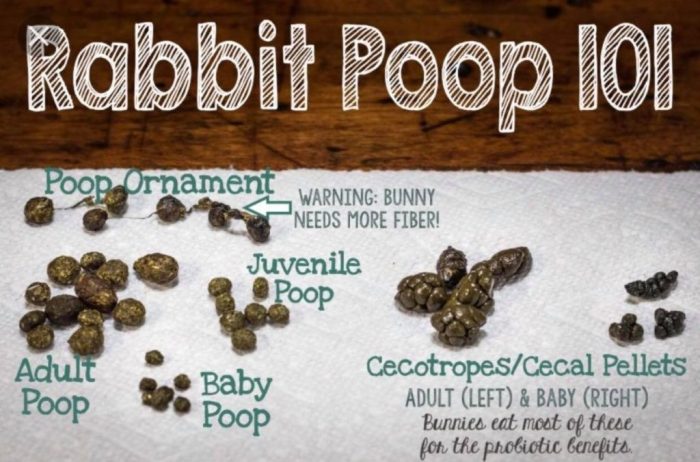Rabbits are fascinating creatures with unique dietary and digestive systems. One aspect that rabbit owners often wonder about is the frequency and quantity of their rabbit’s poop. Understanding the normal pooping habits of rabbits is crucial for ensuring their well-being.
This guide will delve into the ins and outs of rabbit poop, covering frequency, appearance, signs of abnormalities, and monitoring techniques.
Rabbits are herbivores with a digestive system designed to process a high volume of plant-based matter. Their poop is an important indicator of their overall health, providing insights into their diet, age, and potential health issues. By observing your rabbit’s poop regularly, you can detect any changes or abnormalities that may require veterinary attention.
Frequency and Quantity

Rabbits typically produce between 100 and 200 fecal pellets per day, depending on their size, age, and diet. The frequency of pooping varies, but most rabbits poop several times a day.
The amount of poop a rabbit produces is influenced by several factors, including:
- Diet: A diet high in fiber will produce more poop than a diet low in fiber.
- Age: Younger rabbits tend to produce more poop than older rabbits.
- Health: Rabbits with digestive problems may produce more or less poop than normal.
Appearance and Texture
Healthy rabbit poop typically appears as small, round, or oval pellets. These pellets have a smooth, firm texture and a matte finish. The color can vary from light to dark brown, depending on the rabbit’s diet.
Shape and Size
Rabbit poop pellets are typically 1-2 centimeters in length and width. They may vary in shape, but they should generally be round or oval. If the pellets are too small or too large, it could indicate a health issue.
Color
The color of rabbit poop can vary from light to dark brown. A healthy diet should produce poop that is a medium brown color. However, if the poop is too light or too dark, it could indicate a dietary imbalance or a health problem.
Consistency
The consistency of rabbit poop should be firm but not hard. If the poop is too soft or too hard, it could indicate a health issue. Soft poop can be a sign of diarrhea, while hard poop can be a sign of constipation.
Signs of Abnormal Poop
Abnormal rabbit poop can indicate underlying health issues or dietary concerns. Recognizing the signs of abnormal poop is crucial for prompt veterinary attention.
Changes in color, texture, or frequency of rabbit poop can signal abnormalities. For instance, black or bloody poop may indicate gastrointestinal bleeding, while green or yellow poop can suggest liver or gallbladder issues. Soft or watery poop may indicate diarrhea, while hard or dry poop can indicate constipation.
Changes in Color
- Black or bloody poop: Gastrointestinal bleeding
- Green or yellow poop: Liver or gallbladder issues
- White or clear poop: Diarrhea
Changes in Texture
- Soft or watery poop: Diarrhea
- Hard or dry poop: Constipation
- Mucous or sticky poop: Gastrointestinal infection
Changes in Frequency
- Excessive pooping: Diarrhea
- Infrequent pooping: Constipation
- Sudden absence of poop: Gastrointestinal obstruction
Monitoring Rabbit Poop
Monitoring your rabbit’s poop is crucial for detecting any changes or abnormalities. It provides valuable insights into their overall health and well-being.
Regular observation of your rabbit’s poop allows you to establish a baseline for what is normal for them. Any significant deviations from this baseline should prompt further investigation.
Signs of Abnormal Poop
- Diarrhea: Soft, watery poop that can be accompanied by urgency or straining.
- Constipation: Hard, dry poop that is difficult to pass or absent.
- Blood in poop: This can indicate a serious underlying medical condition and requires immediate veterinary attention.
- Mucus in poop: Small amounts of mucus are normal, but excessive mucus can be a sign of infection or inflammation.
- Changes in color: Black poop can indicate bleeding in the upper digestive tract, while green poop may indicate a diet high in greens.
- Parasites: Small white worms or eggs in the poop can indicate a parasitic infection.
Importance of Veterinary Consultation
If you notice any changes in your rabbit’s poop, it is essential to consult with a veterinarian promptly. They can perform a physical examination, run tests, and provide appropriate treatment to address any underlying health issues.
Final Summary
Monitoring your rabbit’s poop is an essential aspect of responsible pet ownership. By understanding the normal frequency, appearance, and texture of healthy rabbit poop, you can quickly identify any deviations that may indicate underlying health issues. Regular observation and veterinary consultation, when necessary, will ensure that your rabbit receives prompt and appropriate care, promoting their overall well-being and longevity.
FAQ Summary
How often should a rabbit poop?
Healthy rabbits typically poop 10-20 times per day.
What is the normal size and shape of rabbit poop?
Rabbit poop is usually round or oval-shaped, with a diameter of about 1-2 centimeters.
What color should rabbit poop be?
Healthy rabbit poop is usually dark brown or black in color.
What are the signs of abnormal rabbit poop?
Abnormal rabbit poop may include changes in color, shape, consistency, or frequency. It may also contain mucus, blood, or parasites.
What should I do if my rabbit’s poop is abnormal?
If you notice any changes in your rabbit’s poop, it is important to consult with a veterinarian to determine the underlying cause and receive appropriate treatment.